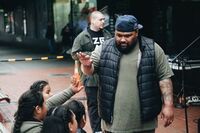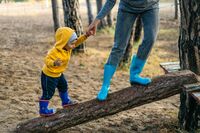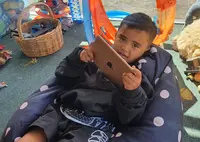Our impact stories


Supporting the mental health of youth
According to a report by UNICEF, Aotearoa New Zealand has the second-highest rate of suicide in the OECD. Māori and Pasifika youth are four times more likely to attempt suicide than Pākehā. Faced with this statistic, youth development organisation, ZEAL launched an in-school culture and identity mentoring programme with an emphasis on suicide prevention.
“A lot of Pasifika youth often aren’t used to talking about their feelings,” says Youth Worker, Tautiaga Faaeteete (Tau). “They may have problems, but don’t have the emotional tools to articulate them.”
That’s where ZEAL comes in. “We help give rangatahi the language to tell their stories.”
ZEAL tailor their approach to the needs of the individual and the challenges they are facing with the goal of building relationships built upon trust and equipping young people with the tools to make good decisions. Sometimes, making a positive change in a young person’s life starts with something as simple as a chat over a coffee or a quick trip into the city, says Tau. “It’s all about creating positive moments to interrupt the mess so rangatahi can discover what makes them tick and come alive.”
Meaningful funding
With COVID exacerbating so many mental health challenges that were bubbling under the surface, ZEAL wished to extend its mental health mentoring programme to Porirua, where they saw a great need. Nikau Foundation was happy to support their changemaking work, and with a $7,500 grant from the Nikau Porirua and Zac Pearson Funds, ZEAL were able to engage two youth workers to mentor six rangatahi per term.

Shifting the dial around the welfare of children
The Totara Fund was started by a family who saw the struggles in their community and wanted to personally make a real difference. They've since grown the fund to support family wellbeing across Tāmaki Makaurau.
The initial focus of Totara Fund was around welfare of children, however it soon became apparent that this often starts with factors beyond a child’s control. The fund now supports the well-being of families with the overarching belief that if we can assist the parents to navigate their lives successfully, then by default we assist the children.
Since establishing the fund with Auckland Foundation it has provided support for The Brainwave Trust, Big Buddy, Te Whakaora Emotional Healing and Family Restoration programmes as well as counselling services at CARE Waitakere to meet the critical need arising post pandemic.
"The positive impact of Te Whakaora Tangata’s Kia Kaha programme has been made possible through the generous support of the Totara Fund. The funding has been vital to the successful delivery of the Kia Kaha programme, where evaluations show an 81% of clients reported an improvement in mental health, 75% noting an improvement in depression and anxiety, 80% reported an improvement in social connectedness, and 58% reporting a reduction in domestic abuse."
- Programme Manager from Te Whakaora Tangata’s Kia Kaha programme.
The ripples of impact are growing, stemming from one family's sincere desire to shift the dial on the problems they were seeing within their own community.
Read the full story of Auckland Foundation's Totara Fund here >>

Closing the loop on food waste in Wellington
A food delivery goes out almost as soon as it comes in at Kaibosh's busy Hopper Street premises. Within ten minutes Kaibosh's distinctively branded truck has been parked up and unpacked; and the food it once contained has been sorted, repacked and stored ready for dispatch later that day. This pace is not out of the ordinary, says General Manager, Matt Dagger. In fact, with the sheer volume of food Kaibosh receives (in one month alone this was in excess of 42,000 kg) and the huge demand for the services they offer, this is business as usual.
Kaibosh is a food rescue and redistribution service and keeping up with growing demand means that they continue to outgrow themselves. Their first hub, located out the back of Wesley Church in Te Aro, central Wellington, quickly became too small and left founders Robyn and George Langlands looking for a way to ensure sustainable growth, to keep up with their accelerated upscaling.
With the help of Nikau Foundation, Wellington's Community Foundation, Kaibosh invested in strategic consultancy, a move which would set the blueprint for all Kaibosh’s future operations and strategic approach.
Matt says, "This consultancy, made possible by Nikau Foundation, gave Kaibosh direction and helped us to prepare for any obstacles that may come our way. It got us through when our Tennyson Street hub was destroyed during the Kaikoura earthquake, it got us through Covid-19, and we see that it will continue to get us through."
Read the full story of Kaibosh and the strategic support provided by Nikau Foundation here >>

Scholarship fund changing lives
Eva Trowbridge, a quiet, unassuming woman who led a humble life working for 25 years as a cleaner at Tauranga Hospital, left a gift that continues to benefit women to this day across the Western Bay of Plenty.
Before her death in 2006, Eva Trowbridge set up her own endowment fund with Acorn Foundation, the Community Foundation for the region, a fund which provides an annual scholarship for an adult student at the University of Waikato's Tauranga Campus.
Since then, 17 local women have been awarded the $3k Eva Trowbridge Scholarship, supporting their path to education and enabling them to give back to community in a range of professions.
And, as the capital in Eva’s fund continues to grow each year, the scholarship is set to continue being awarded for many years to come.
“I think Eva’s story in today’s world is such an inspirational story," says Kiri Diamond, who won the scholarship in 2011.
"What I see from her story, and I’m getting chills as I say this, is her strength. And it’s a quiet strength. We went through a time where to be seen as a strong leader you had to be kind of loud, but she actually led with servitude and I think that resonates a lot with women.”
With support from the Eva Trowbridge scholarship, Kiri achieved her bachelor’s degree and went on to graduate with a master’s degree in community psychology.
Kiri now works as strategy and engagement manager at South Waikato District Council, managing the impacts of public infrastructure projects on the community. Kiri also founded Kia Mau (Talent) Charitable Trust, where she created Pūaki, a personal development programme founded in kaupapa Māori and supported with cognitive psychology and neuroscience.

Building the hub of community
The Waikato Regional Theatre is an impressive state-of-the-art, world-class performance venue with a stunning vista of the Waikato awa - the pride of Kirikiriroa-Hamilton. Momentum Waikato Community Foundation has been leading the Theatre project since its inception.
Working with a range of partners, including mana whenua, the business community, local and central government and community funders, the Momentum Waikato team have skillfully ushered this transformational project into reality.
The new multi-purpose performing arts centre transforms the Hamilton CBD, and is already catalysing local creative industries and drive the Waikato’s cultural life and identity for decades to come.
The Theatre’s 1300-seat auditorium feature crystal-clear acoustics, up-close sightlines and a range of possible stage and viewing configurations, enabling it to showcase any and every kind of live performance.
And, while the Theatre was being built, Momentum Waikato Community Foundation continued on with the dual mission of building a new and impactful regional endowment fund, and driving more transformational projects for the local community.
Read more about the Waikato Regional Theatre, now named BNZ Theatre, here >>

Changing lives for the hearing and visually impaired
The Hearing and Visual Impairment Fund was established to help Taranaki people who have a hearing or visual impairment to access equipment or technology that can have a transformational impact on their daily life.
Through the generosity of one local donor, Taranaki Foundation have been able to distribute grants to individuals to purchase specialist equipment. “We’ve been honoured to work with this kind, generous donor to realise her aspirations to help people with disabilities,” says Taranaki Foundation Chief Executive, Josh Hickford.
Over the last 8 years, grants have been given for specialist smoke alarms for deaf children; cochlear impact covers to enable children with implants to be able to hear while swimming or playing sport in the rain; assistive technology for learning and working; a tandem bike for a keen blind cyclist and a static exercise bike to help a visually impaired student keep fit and enjoy movement.
One of the young Taranaki students who recently received hearing aids said how life-changing this grant had been. “These hearing aids mean so much to me as I can finally hear what people are trying to say to me. They really are a game-changer – hearing is such a relief!"

Seeding a fund to support youth
Pam Holyoake wanted to establish a legacy in remembrance of her late husband, Peter. Through Top of the South Community Foundation, Pam decided to do this by providing the seed capital for a new ‘Nelson Tasman Youth Development Fund’.
This fund will be invested and will support young people to stay in school and to continue their education, or to assist with their transition into the workforce. Distribution of funds will be via local Secondary Schools, which will have an opportunity to apply to the Foundation each year.
Peter and Pam lived in the Tasman region for many years and Pam wanted to give back to the wider community, with a focus on supporting young people. "Initially I wanted to set up something that supported apprenticeships in the building industry, as Peter was a painting contractor. However, following discussions with the Foundation, I’m very happy that our donation will make a difference to local young people in need”, Pam said.
The first school to benefit from the Fund will be Motueka High School. “There is a need currently to employ resources that focus on our year 10-12 students some of whom are at school one day, and then simply do not return. There can be a variety of reasons why this occurring, from family needs to them simply losing motivation to study. We want to get them back to school and that often takes a lot of quite intensive and personal intervention”, said Motueka High School Principal, John Prestidge.
Some examples of initiatives that are to be supported by the Youth Development Fund include NMIT courses and practical on-the-ground industry training, to enable students to transition into the workforce.

Championing community need
Rotorua’s Allan and Jan Sewell are community champions. The couple established the Sewell Family Fund with Geyser Community Foundation, liking the idea that donations made through the Foundation will be invested, with the income used to benefit charities in their particular areas of interest.
To date, more than a dozen local charities and organisations have received support from the Sewell Family Fund, including St John, which received a generous donation to purchase a brand new ambulance shuttle, to help Rotorua’s carless patients to get to their appointments
“The Rotorua community has been good to us over many years and we wanted to give something meaningful back,” said Allan. “We feel very privileged to be able to do this and are pleased to be involved with Geyser Community Foundation, which is the ideal charitable vehicle for us.”
The couple like the idea that, while they are alive, they are able to choose who will receive the annual distributions and can nominate different organisations and charitable causes, if they wish.
“We especially like the idea that donations made through Geyser are used for charitable purposes which benefit the local community year on year, forever. This is a very powerful way of giving and something that will continue long after our lifetimes.”
Local organisations and causes supported by the Sewell Family Fund over the past 10 years:
Arthritis NZ - Children’s Camp; BayTrust Rescue Helicopter; Cystic Fibrosis Bay of Plenty; Papamoa Surf and Lifesaving Club; Ronald McDonald House Retreat Rotorua; Rotorua Community Fund; Rotorua Community Hospice; Rotorua Hospital Chaplaincy Trust; Rotorua Mountain Bike Club – First Response Unit; Rotorua Lakes Volunteer Coastguard; St John Rotorua; Salvation Army Rotorua
Some of the impacts of the donations from the Sewell Family Fund:
- A brand new ambulance shuttle to help carless and vulnerable patients to get to hospital appointments. “If it hadn’t been for the Sewell Family Fund we wouldn’t have been able to replace our old shuttle, which provides an important service to the city, particularly for those who can’t afford transport to get to appointments,” Rotorua St John Chairman, Ross Burns.
- “Without this medication (from the Sewell Family Fund) one little girl suffers from seizures, which has a huge impact on her family. Her unfunded medication costs $1,050 per prescription. With the medication, the child has a certain quality of life. This vital medication also minimises stress and worry for her entire family,” Rotorua Hospital Chaplaincy Trust.
"The work of Community Foundations has deep roots in communities and can utilise community knowledge and insight to connect local philanthropy with shifting community needs and aspirations."


